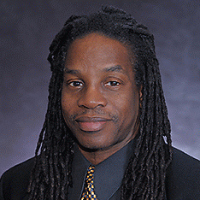Clarence Lusane knows well the power that American institutions have to shape lives.
As a student at Wayne State University in the early- and mid-1970s, Lusane was among the first in his family to attend college. After enrolling in the university’s now-defunct Monteith College, Lusane ultimately graduated in 1976 with a communications degree.
 “Wayne State was an important institution — a lifesaver for many young people who were first- generation,” says Lusane, a political science and international relations professor at Howard University. “Our parents thought it was a good idea for us to go to college, but they didn’t know what that meant. So we depended on the institution to shepherd us out — and it did. I loved Wayne State. It was a great four years.”
“Wayne State was an important institution — a lifesaver for many young people who were first- generation,” says Lusane, a political science and international relations professor at Howard University. “Our parents thought it was a good idea for us to go to college, but they didn’t know what that meant. So we depended on the institution to shepherd us out — and it did. I loved Wayne State. It was a great four years.”
Lusane will speak Thursday, Feb. 8, at 12:30 p.m. in Wayne State Law School’s Spencer M. Partrich Auditorium as part of the university’s celebration of Black History Month. He is also slated to speak at 6 p.m. at the Charles H. Wright Museum of African American History.
Since graduating in 1976, Lusane, 64, has kept his laser focus on institutions, including perhaps the most fundamental in the country: the White House. In 2011, Lusane penned his groundbreaking book, The Black History of the White House, a seminal look at African Americans’ oft-obscured role in crafting both the historic building and the U.S. presidencies it has housed.
 “The book came about when Barack Obama was running for president,” recalls Lusane, whose lecture will be presented by the Department of African American Studies. “I was contacted by a publisher to write a book about Obama and thought it’d be more exciting to write about the evolution of the presidency and the White House as ways to look at America’s racial past. I was initially going to write a straight history — this is what happened, and that’s what occurred — but as I began to do the research, there were stories that I hadn’t heard and didn’t know. The book took a sharp turn because of these narratives.
“The book came about when Barack Obama was running for president,” recalls Lusane, whose lecture will be presented by the Department of African American Studies. “I was contacted by a publisher to write a book about Obama and thought it’d be more exciting to write about the evolution of the presidency and the White House as ways to look at America’s racial past. I was initially going to write a straight history — this is what happened, and that’s what occurred — but as I began to do the research, there were stories that I hadn’t heard and didn’t know. The book took a sharp turn because of these narratives.
“People who told their narratives weren’t well-known but were people who left their print on the White House,” Lusane continues. “African-Americans built it. I never thought the White House was built as a symbol of conflict between slavery and the desire for freedom. When I began to do the research, nobody had any information on that.”
Given his expertise, it’s little wonder that Lusane’s theme for his speech at the Law School is “African American Politics in the Trump Era.”
“The theme is meant to open a discussion about the political context we’re facing at the moment,” explains Lusane. “We just came out of the Obama era, and we’re still assessing that. How did that change or impact black American politics? Then we shift to a radically different circumstance; now, there are people who aren’t going to act in the interest of the black community. There’s a resurgence of white nationalism. You’ve got white supremacists proudly marching in the streets. How do we assess strategies, tactics and even goals we should have in this period? How do you achieve those?”
